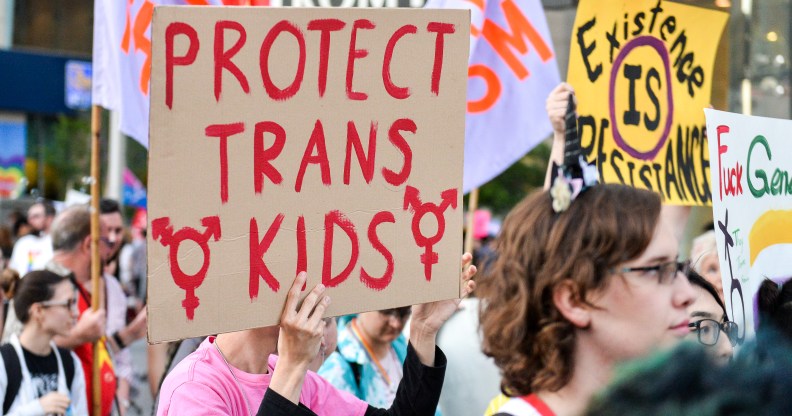Trans kids will not be referred for puberty blockers following High Court ruling, UK’s only youth gender clinic confirms

(Anatoliy Cherkasov/SOPA Images/LightRocket via Getty)
The only NHS gender clinic for under-18s has stopped referring transgender youth for puberty blockers following a High Court ruling.
The Tavistock and Portman NHS Trust, which runs youth gender clinic GIDS, has confirmed that no new referrals will be made to endocrinology services until there is more “clarity” on the situation following the judgment on Tuesday (December 1).
A spokesperson confirmed that no current GIDS patients who take puberty blockers have been contacted yet, due to the a stay on implementation for the time being.
“The court has ruled that there will be a stay on implementation of its judgment until the later of 22 December or the determination of any appeal,” they said.
“This will give us a chance to work through the specific implications of the judgment for different patient groups with our partners, University College London Hospitals NHS Foundation Trust and Leeds Teaching Hospitals Trust.
“We will not be making new referrals to endocrinology until we have more clarity.”
GIDS has published a Q&A for current patients to help ease the uncertainty around the judgment. For those currently taking puberty blockers or HRT, GIDS says “they will be in touch with you once more detail is known to let you know what will happen with regard to your care”.
Puberty blockers ruling impacts trans under-16s.
The verdict came in a case brought by Keira Bell, 23, and the mother of a trans teen. It argued that under-16s cannot give informed consent to puberty blockers, a reversible, “life-saving” treatment that prevents trans kids from going through the wrong puberty.
Transgender under-16s must now understand the nature and implications of puberty blockers, hormone replacement therapy (HRT) and the likelihood of having gender-affirming surgery before they can be deemed to give their informed consent to blockers, the High Court has ruled.
The judges said in their ruling that it is “doubtful” children aged 14 to 15 could understand “the long-term risks and consequences” of taking puberty blockers and then hormone replacement therapy (HRT), and “highly unlikely” that children under 13 would be competent to give consent.
As a result, the court said clinicians may “regard these as cases where the authorisation of the court should be sought prior to commencing the clinical treatment”.
GIDS confirms on its website: “The ruling applies to the treatment of puberty blockers rather than GIDS itself, which means that all providers, public and private, are bound by it. This includes where providers are based overseas, but treatment is administered in the England and Wales.”

